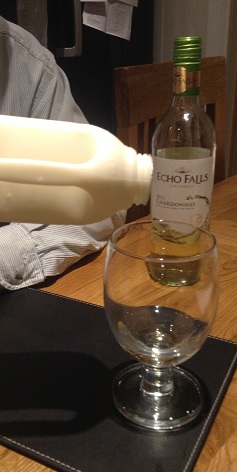Do you love a glass of wine, or two? If you have allergies you should be aware that some wine can contain allergens, including egg, milk and fish. This can cause skin flare ups, flushing and stomach discomfort, though should be in small enough quantities so as not to cause anaphylaxis.
Did you know wine could contain these allergens? Do you get an allergic reaction when you drink wine?

Look for allergens in wine labels
Wine labels should list sulphites as well as any of the top 14 allergens that may be used. This is now mandated by law and fish, egg and milk are used to help clear the wine which is called a fining agent. Other ingredients such as chemicals or clay can be used instead and most wine doesn’t contain these allergens. Keep your eyes peeled for them though!
There are lots of safe wines you can drink
You’d be right to be worried. Could some wine contain enough of the allergen to produce an anaphylactic reaction? It’s possible, so look out for Vegan, Organic or Biodynamic wines. Check the labels to see if allergens are present and get to know some mainstream safe ones for when you are out drinking in pubs or restaurants. Always ask the waitress or waiter to check for you or let you read the label before ordering.
I found a really good article in Foods Matter magazine which explains the legislation and why wine manufacturers add these ingredients. There is also a list of wines which are dairy and egg free so it’s well worth a read.
Histamine could be causing your wine allergy
Red wine can contain histamines which can trigger other allergies and asthma. Not technically an allergy, this can still be very painful and uncomfortable. It’s impossible to know how much histamine is in any wine so it might be worth steering clear of wine and finding a low histamine drink instead such as white run, tequila or vodka.
Yeast in alcohol
If you have a yeast allergy anything fermented like wine, beer, cider etc. could cause you problems. Champagne is yeast free, as are drinks like gin, tequila, rum and vodka.
Are you allergic to wine?
Some people can just be allergic to wine and alcohol full stop, any alcohol will cause a severe reaction for them. Do you have an allergy to wine? Or do you react to something put in the wine, like allergens, sulphites or chemicals? What’s your favourite safe go to wine?
Photo by Valeria Boltneva from Pexels











Phew, at least champagne is free!
It is amazing what you find in food and drink sometimes. Thanks for the links to those articles – they were very interesting.
Your article on alcohol was really interesting. I can’t touch the stuff without getting a wallopping headache creeping up the back of my neck within 10 minutes of drinking any kind of alcohol.
It is not so bad if I drown lager with lemonade but still it’s risky and I always carry headache tablets because the headache just gets worse and never goes away by itself.
My Mrs says sherry does that to her but with me it’s all my favourite tipples. I love the taste but I know what is coming.
I recognised the puffy face, red blotches type symptoms too. When I was younger and could drink the odd pint or two I used to drink Guinness and used to go out every Thursday night with the lads but I would be on the painkillers as soon as I came home.
One Thursday night we were about to go home and my friend asked “what’s the matter with you?”. I had developed a huge rash all over my face and halfway down my chest front and back and had no idea why. It soon became obvious what the cause was. Every time I drank, usually Guinness or Murphy’s, I would come out in a big rash and my skin would be red hot. This carried on for a year and a half and then stopped as suddenly as it started.
Weird. I assumed the breweries had changed their recipe or something but it wasn’t limited to Guinness!
These days I usually stay away from alcohol. It’s just easier.
Hi Rick. Thanks for the comment. So I’m not alone with the alcohol reactions then? What I find is that I don’t ALWAYS react. Sometimes I can drink 3 large glasses and have no problems at all, and other times one glass will send me over the edge with puffy eye lids, itchy runny eyes and nose, hard white nettle rash on my forehead, cheeks and neck. Most attractive! I’ve tried organic and bio diverse wines – these are supposedly harvested or picked on some kind of lunar calendar – no idea what this means – however I’ve never had a reaction with these special wines. I think the purer and simpler the better. Steering clear is usually the safest bet but not so much fun. Keeps us healthy though. Thanks again for the comment.
As a nutritionists, I would suggest that your symptoms are showing a liver that is too acidic. If you can try to introduce more alkaline foods you may be able to have the odd tiple without a headache. A pounding headache is a clear sign of too much acid and a liver that is struggling. By drinking a capful of aloe vera juice 3 times a day this will help to make your liver more alkaline as will eating more raw vegetables or juicing up some green vegetables. Hope this helps.
HAve a look at Vintage Roots – a company that sells vegan and organic wines and is very genuine about what they do. Not too much of a premium either.
Hi Alex. Thanks for the comment. I’ll check them out.
Only just seen this thread – very interesting, as my hubby sometimes has a VERY weird reaction to wine (most commonly red)…not always. A few years ago it seemed to be mostly, now it seems relatively rare, but it can be quite severe if it comes on.
Strangely enough, though, he ISN’T allergic to any other foods as far as we’re aware… go figure!
If anyone else has a similar pattern, we’d be interested…
In my experience of treating acne and poor health, I have found that alcohol can have a reaction for various reasons. One reason is the lactic acid that is contained in many wines. To be safe from this acid always buy a RESERVE wine or as someone has already recommended an Organic wine. These will not contain lactic acid. A new Zealand wine producer once told me that lactic acid was added to new world wines to age them whilst rserve wines did not need this to be added as it was made from the first pressing of the grape. This process seems to have crept its way into French wine making and who is to say who else is now using this acid. Certainly my experience of Italian and Spanish wines show these to be okay but things change!
Another reason why alcohol can be a problem is that it is very acidic. The liver can often become too acidic and can start to malfunction. Most western food is acidic and adding alcohol to a diet high in sugar, salt, fat and refined bread can just be too much causing a reaction. If you find that you have a reaction it is a good idea to have a capful of aloe vera juice the morning after to make the liver more alkaline and help to remove the toxins. It would also be worth doing a detox and avoiding alcohol for a while to allow the liver time to recover. Juicing green vegetables is also helpful in keeping the liver more alkaline.
Another reason why wine can be a problem as someone has already mentioned, is the presence of yeast. Many people have a candida overgrowth and the addition of wine only causes candida yeast to multiply and let off toxins. Candida yeast release 30x more toxins than the toxins released from alcohol therefore the combintation of both can result in a damaged liver. The only way to resolve this would be to avoid alcohol that contains yeast, and speak to a nutritionist that deals with the elimination of candida albicans.